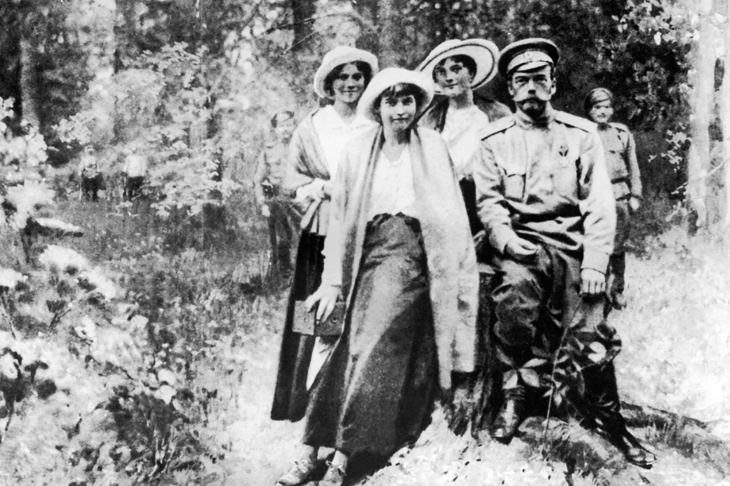The true tragedy of the last Romanovs was a failure of imagination. Both during his last disastrous months in office and throughout the slowly unfolding catastrophe of his imprisonment, Nicholas II failed to conceive of how quickly the world around him could change, or just how desperate and ruthless the revolutionaries could be. A similar naivety was shown by his would-be rescuers.
Helen Rappaport’s frank and brilliant study of the various efforts to save the Romanovs begins, intelligently, with the race to save them from themselves. Their downfall began in 1916 as the course of the first world war began to run against Russia. Nicholas reacted by attempting to take personal control of the war effort, leaving his foolish, hysterical wife Alexandra and her spiritual mentor Grigori Rasputin in charge in Petrograd. Some of the most surprising material in the book concerns the mass efforts by European royal cousins as well as closer Romanov family members to avert the obvious disaster with personal letters, diplomatic entreaties and even threats of a palace coup.
Though the last days of the Romanovs are among the most thoroughly ploughed fields of historical research, Rappaport nonetheless manages to unearth new material. A suitcase of unsorted papers from the literary estate of a fellow Romanov-watcher yields extensive transcripts of royal correspondence hidden in the Romanian royal archives. From this we learn quite how deeply the Empress Alexandra’s royal relatives loathed her. ‘My innermost conviction is that [Alexandra] is suffering from a mild, but morally serious kind of insanity,’ wrote her aunt, the Duchess of Coburg, to her daughter, Crown Princess Marie of Romania, in February 1913. ‘Alix, to my mind, is absolutely mad, everything she does is dictated to her by this false prophet [Rasputin],’ she wrote later.
None of the would-be saviours of the dynasty acted. Instead, middle-class revolutionaries toppled Nicholas in February 1917 and confined him and his family to the Alexander Palace in Tsarskoye Selo. Initially, the provisional government were desperate for the imperial family to leave Russia. The foreign minister Pavel Milyukov urged the British to provide a battleship to ferry the deposed royals into exile.
Britain sent no ship. Was George V therefore responsible for abandoning his first cousin and lookalike Nicholas II to his death? Rappaport handles the controversy with admirable rigour, cutting through the mythology and backside-covering that followed the Romanovs’ murder.
The actual story is as simple as it is tragic. George V’s first action was to send a personal letter of support to his deposed fellow monarch. The British wartime government, dominated by the Liberals and Labour, felt honour-bound to support their sovereign, despite profound misgivings about the Romanovs (and, in some cases, private support for the Russian revolution) and reluctantly issued an offer of asylum. But it was the King who changed his mind — or rather, had his mind changed for him by his private secretary Lord Stamfordham, who compiled a daily scrapbook of the most lurid anti-monarchical press cuttings that threatened revolution if the Romanovs came to Britain. George V, evidently every bit as easily swayed as Nicholas II but — fortunately for Britain — not actually in charge of anything, bowed to Stamfordham’s psychological pressure and pressed the government to withdraw the invitation.
In fact, notes Rappaport, the whole debate is moot for the simple reason that within a couple of weeks of the February revolution the provisional government’s power was already being eclipsed by the much more radical Petrograd Soviet, which called for Nicholas’s imprisonment.
In March 1917 the British military attaché in Petrograd breezily claimed that ‘a fast torpedo boat and a few bags of British sovereigns’ could have got the family out across the Gulf of Finland. But in practice it was already too late to escape the forces of the Soviet, who controlled the roads and railways.
A final window of opportunity for rescue opened up after the family were moved, with a reduced entourage of only 39 servants and retainers, to the Siberian town of Tobolsk in August 1917. The provisional government feared that a radical mob might try to seize them. As at Tsarskoye Selo, they were imprisoned behind a high fence in the ramshackle governor’s mansion, but were at least guarded by respectful soldiers and had a sympathetic commander. From a balcony, the family were able to see the locals bowing and crossing themselves as they passed by.
The moment to act would have been in the first days. But again, their would-be rescuers among Russia’s monarchists were disorganised, penniless and riven by bickering and tragicomic ineptitude. One of the more plausible rescue plots required a British officer’s manservant, trained as a barber, to enter the Alexander Palace, shave the Emperor’s beard and don a false one himself, then quickly swap uniforms. ‘The young officers were enthusiastic about all the mystery-mongering, the passwords, signs, and other paraphernalia of conspiracy,’ recalled one conspirator. ‘But they had no idea of the technical side of such activities.’
One friend of the imperial family, the 22-year-old Rita Khitrovo, took it upon herself to travel to Tobolsk with personal letters and small presents, but was quickly arrested. The effect of Khitrovo’s inept mercy mission was to get a ruthless commissar sent from Moscow as the imperial family’s new commandant. As a hardened revolutionary who had spent more than 30 years incarcerated and in Siberian exile, he was in no mood to allow the autocrat in whose name he had been imprisoned to escape retribution.
From then on, the family’s fate was truly sealed. Various adventurers and fantasists continued to hatch plots; but once the Bolsheviks took power in October 1917, the family were definitively condemned to face revolutionary justice. Lenin considered a trial. Instead, an army of Czech prisoners-of-war advancing on the Romanovs’ place of imprisonment in Ekaterinburg forced the Bolsheviks’ hand. Three hundred years of the Romanov dynasty ended in a chaotic bloodbath in a small basement. As Rappaport shows, there never really was a moment when the Romanovs might plausibly have been rescued. Their self-appointed saviours were 19th-century romantics; their murderers, 20th-century killers.

























